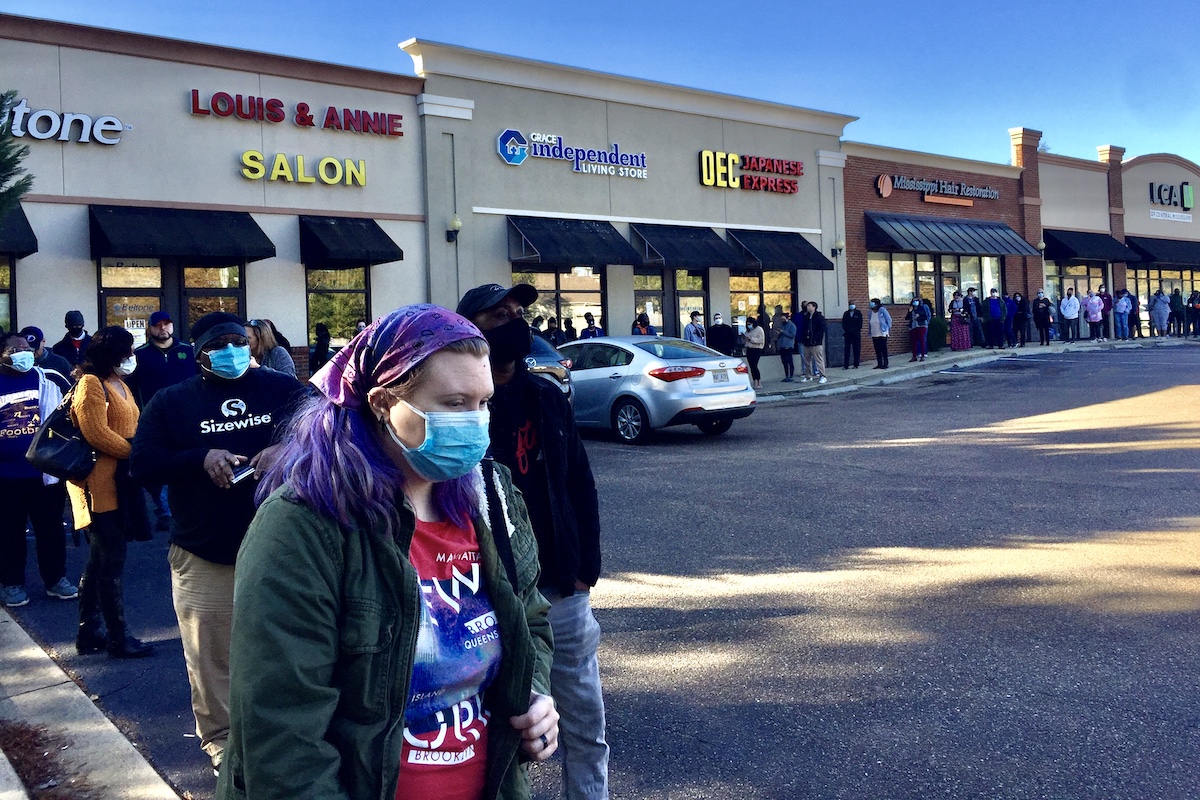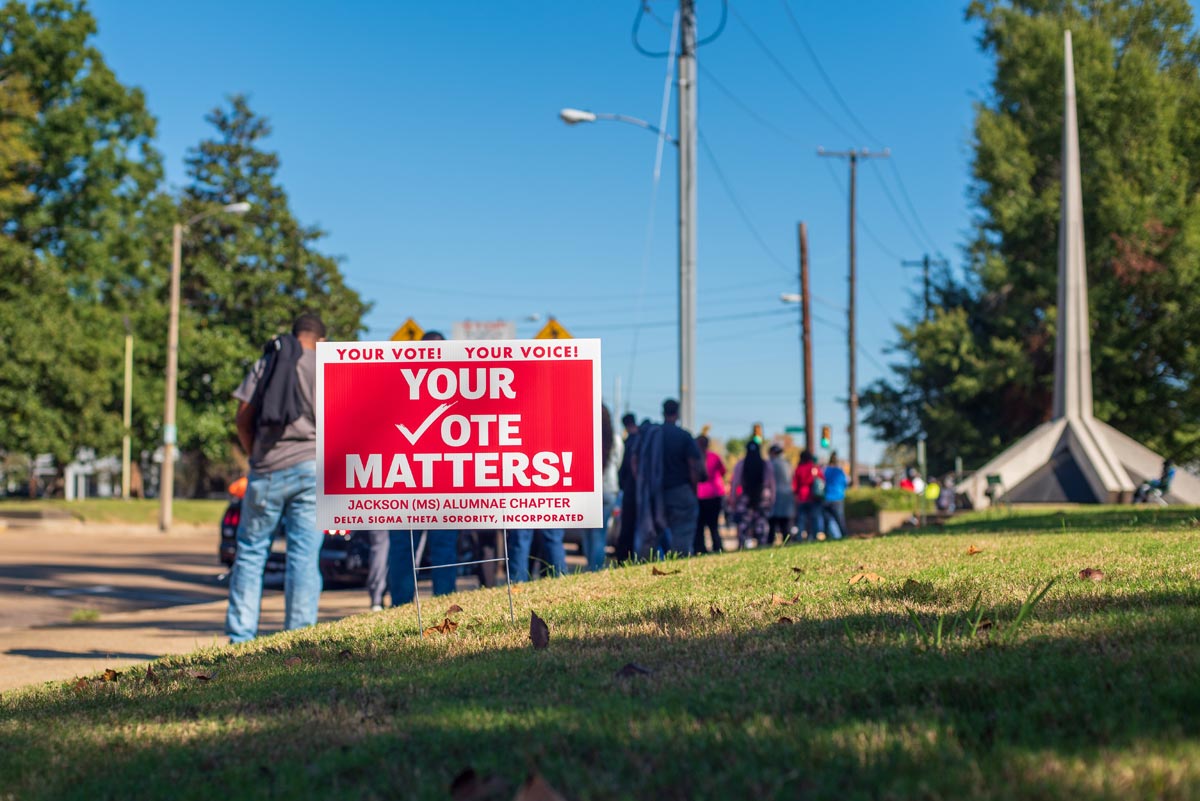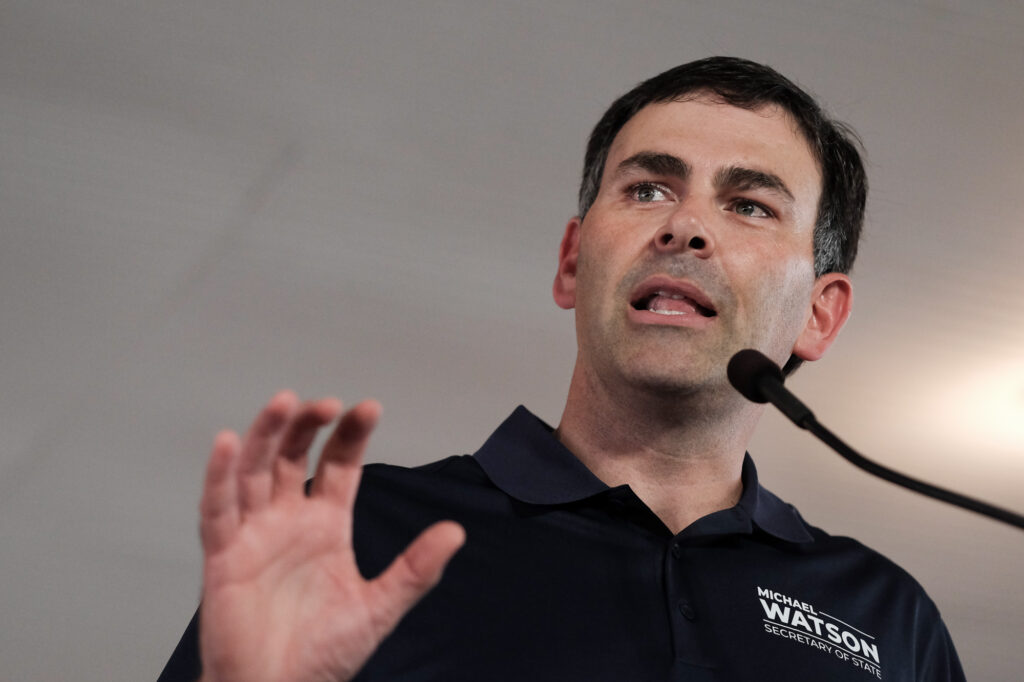Mississippi election officials risk disenfranchising thousands of voters unless they make changes to ensure voters have access to accurate polling-site information, a coalition of civil-rights and voting-rights groups said in a letter to Mississippi Secretary of State Michael Watson on Friday, Oct. 14.
The letter, which cites investigations the Mississippi Free Press conducted in 2020 and 2022, notes that “poll site changes impacted thousands of Mississippi voters ahead of the 2020 election due to omissions or inaccurate reporting of those changes to the Secretary of State’s online poll site locator.”
The groups joining the letter include the NAACP Legal Defense Fund, the ACLU of Mississippi, Black Voters Matter, the Mississippi Center For Justice, the Lawyers’ Committee For Civil Rights Under Law, the Mississippi Black Women’s Roundtable, One Voice and the Southern Poverty Law Center.
In October 2020, the Mississippi Free Press reported that the Statewide Elections Management System, the database where county election officials report polling site locations and changes to the Mississippi Secretary of State, failed to note dozens of changes. The inaccuracies within the SEMS database led Secretary of State Michael Watson to initially report just 17 polling place changes affecting about 18,600 Mississippi voters.
But an MFP analysis that Ashton Pittman and William Pittman conducted found that officials had made changes to at least 55 precincts affecting about 65,000 voters. Afterward, Watson’s office updated its list of changes to include the additional ones MFP had found. On Election Day 2020, voters across the state reported confusion over the location of their polling places, with some waiting hours in line before learning voting officials had changed their voting precinct months earlier without informing them.
In some cases, voters had relied on the Secretary of State’s online polling place locator, which draws information directly from SEMS, which relies on local election officials in all 82 counties to submit changes and keep information updated. In places where local officials had not submitted accurate information to SEMS, though, the locator tool sent voters to the wrong location.
Civil-Rights Groups Propose Solutions
The civil-rights organizations initially wrote Watson in March 2022 to raise their concerns about the issues with SEMS, noting the “widespread reports of inaccurate or outdated information about polling site changes as voters throughout Mississippi received conflicting information from local election officials and the Secretary of State’s online poll locator.” Along with referencing reports from the Mississippi Free Press and other outlets, they noted that “one Lauderdale County voter reported to LDF that she visited three different polling sites because she had not been notified that her polling place had changed.”
“To avoid similar problems during the 2022 election cycle, the Secretary of State should ensure the online poll locator reports timely and accurate information to voters by requiring county governments to immediately report polling site changes to your office and into the Statewide Elections Management System (SEMS),” the March 17, 2022, letter said. “Mississippi law requires county Boards of Supervisors to provide notice to the Secretary of State before implementation of any polling site changes, but it appears that there is inconsistent compliance with the law and confusion about whether county or state officials must update SEMS.
“Moreover, there are no regulations governing how and when voters receive notice of polling site changes,” the letter continued. “The impact to voters is significant, and we are writing to urge you to address this problem immediately to ensure compliance well in advance of the 2022 mid-term elections.”
The letter pointed out that Mississippi’s “limited absentee voting” options and total lack of early voting options means that “the vast majority of voters must vote in person on Election Day,” making it even more important that voters know where to go on Election Day.
The civil-rights groups suggested three changes that Watson’s office could make: “1) promulgate rules instruction Election Commissioners or other authorized election officials to timely enter polling site changes into SEMS; 2) issue guidance establishing a timeframe and process for county Board of Supervisors to report polling site changes to your office; and 3) issue guidance establishing requirements for the timing and adequacy of notice to voters about polling site changes.”
‘Mississippi Is a Bottom-Up State’
Secretary Watson responded to the civil-rights organizations in a letter on April 5, 2022, assuring the civil-rights organizations that one of his “main objectives is to ensure every qualified voter in the state of Mississippi exercises their right to vote,” calling it “one of our most fundamental rights.” But, he added, “Mississippi is a bottom-up state, meaning local officials run our elections.”
“The role of the Secretary of State’s office is to assist counties in conducting elections, which includes training election officials, collecting campaign finance and lobbying reports, collecting election returns, providing assistance to local election officials in carrying out their election-related responsibilities and administering the Statewide Election Management System (“SEMS”),” Watson wrote. “… Because the role of my office is limited to the administrative process of housing the SEMS database and the data stored thereon, any rules promulgated by our office would likewise be restricted.”

“Thus, without additional authority granted by the legislature, we cannot implement the rules or act on the guidance listed in your letter. In regards to our polling place locator, we will continue to explore possible improvements and work closely with county officials to ensure polling place information is accurate and easily accessible to Mississippi voters,” Watson said. “While we serve in a supportive role for county elections, we are constantly looking for ways to protect the right to vote. Voter participation is essential to the continuation of our democracy, and I remain committed to making it as easy as possible for voters to safely and securely make their voices heard.”
Before the June 2022 party primaries, the Mississippi Free Press reported that local election officials in Mississippi had made changes to 70 voting precincts since the 2020 election, but 16 of those changes had not been made in SEMS; the reporters only identified those changes after calling circuit clerks and election commissioners in all 82 counties.
‘This Matter Is Urgent’
On Friday, Oct. 14, the civil-rights groups wrote Watson again, saying they “were encouraged by (his) stated commitment to ensuring that every eligible voter in Mississippi is able to exercise their right to vote.”
“However, we are concerned that your refusal to implement the specific recommendations we outlined in our previous letter has and will result in the continued disenfranchisement of Mississippians,” the organization continued. “Public reporting and our own monitoring have revealed that many of the polling place changes that occurred since the 2020 election were either not reflected in the Statewide Election Management System (SEMS) or were reflected incorrectly leading up to the June 2022 primary election,” the letter said, citing the Mississippi Free Press’s June 2022 report.
The letter stressed that polling place “changes disproportionately impact Black voters,” calling it “essential” for Watson to “remedy these needless sources of confusion and disenfranchisement.” The groups once again urged him to adopt their prior recommendations, arguing that he does “have the authority to issue the rules we recommended.”
“But even if you did not, most of our recommendations are for the issuance of non-binding guidance,” the letter said. “Nothing precludes you from doing this.”
Still, the groups argued that Watson has “the authority to issue a rule requiring election officials to update SEMS with poll site changes under Mississippi Code § 23-15-165.”
“In fact, your office has issued rules under similar authority before—indeed, at least three times,” the letter continued. “Mississippi may be a ‘bottom up’ state, but your office routinely issues rules that reach even further (and rest upon less clear statutory authority) than the rules we request.”
The groups cited rules Watson issued requiring county registrars to “abide by strict timelines when issuing voter ID cards,” to a rule establishing “a rigid timeline for when SEMS data may be incorporated into” electronic polling books and a rule creating “a deadline to submit ballot cure forms, as well as extensive voter notification procedures.”
“Compared to all three of these rules, our proposed rule is more firmly grounded in the statute and would be even less burdensome on counties and voters,” the letter continued. “We do not ask you to exercise your authority in ways that exceed what you have done in the past. … This matter is urgent. Given the proximity of the election, we ask for action and a response to this letter as soon as possible, and no later than October 18th.”
The letter’s signatories included Tanner Lockhead and Amir Badat of the NAACP Legal Defense Fund; ACLU of Mississippi Executive Director Jarvis Dortch; Mississippi Center For Justice President Vangela Wade; One Voice Executive Director Nsombi Lambright; Black Voters Matter National Legal Director April Albright; Mississippi Black Women’s Roundtable Director Cassandra Welchlin; Southern Poverty Law Center Deputy Legal Director Bradley E. Heard; and Voting Rights Project Counsel Jennifer Nwachukwu.
Voting on Election Day
The general election is on Tuesday, Nov. 8, 2022. Voters can verify their vote registration is active by checking online at this link.
When they arrive at the polls, voters must bring an acceptable form of photo identification, such as a driver’s license, state-issued photo ID, U.S. passport, government employee ID card, student ID from a state university or college, firearms license, tribal ID or a Mississippi Voter Identification Card. Information on how residents can obtain a free voter-identification card from their local circuit clerk’s office is available here.

Voters are eligible to cast a ballot if they registered at least 30 days before the general election. More information on voting is available on the Secretary of State’s FAQ section and Voter Information Guide.
Editor’s Note: The Black Voters Matter Fund provided support for the Mississippi Trusted Election Project’s Phase 2 precinct-change research.










